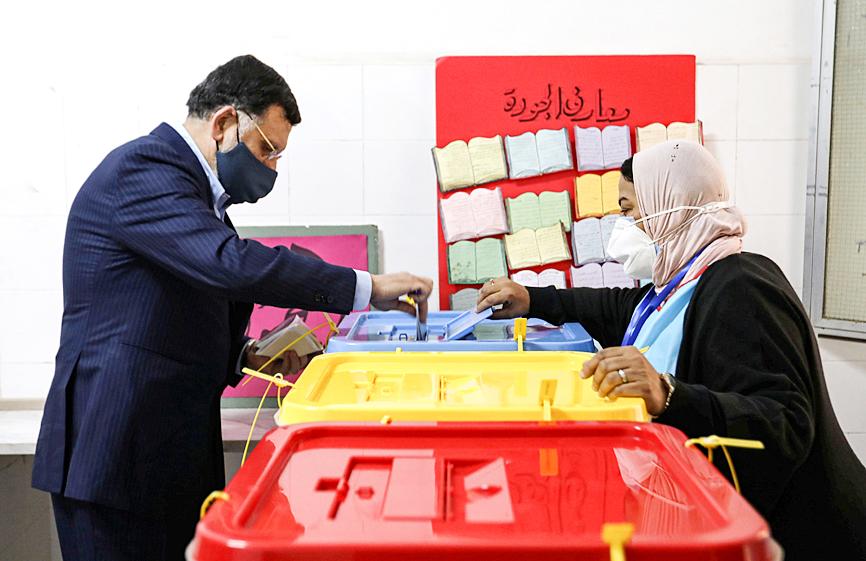Libya on Saturday embarked on a new phase of its transition after an interim executive was selected to lead the country until December elections, following a decade of chaos since late Libyan leader Muammar Qaddafi was deposed.
In a potential turning point accord cautiously welcomed by key powers, four new leaders from Libya’s west, east and south face the task of unifying a nation torn apart by two rival administrations and countless militias.
Abdul Hamid Dbeibah, a 61-year-old engineer, was on Friday selected as interim Libyan prime minister by 75 Libyan delegates at UN-led talks outside Geneva, Switzerland, the culmination of a dialogue process launched in November last year.

Photo: AFP
The new prime minister on Saturday called for the “reconstruction of the country” and promised to be “ready to listen to and work with all Libyans, whatever their ideology, affiliation or region.”
In his first address in the new role, he described the selection process as “democratic and reunifying” after “conflicts and divisions that have affected the Libyan state and its institutions.”
“The result ... is a consecration of democracy and unity,” he said in a televised address.
It marks the start of a new chapter for Libya after the failure of a 2015 UN-brokered deal that established a Government of National Accord headed by then-Libyan prime minister Fayez al-Sarraj.
Libya has been mired in violent turmoil with divisions between the Government of National Accord in Tripoli and a rival administration backed by Libyan National Army Commander Khalifa Haftar.
Acting Special Representative of the UN Secretary-General for Libya Stephanie Williams, who facilitated the week-long talks in Switzerland, called it a “historic moment.”
“I do believe it is a breakthrough,” UN Secretary-General Antonio Guterres said.
In the center of Libya’s capital Tripoli, citizens guardedly welcomed the news.
“At first, Libyans were not optimistic, but yesterday, the joy was palpable, because we saw these initiatives for the emergence of a state,” said 43-year-old Adil al-Kakli.
However he added that the plan to hold elections in December remained too ambitious.
France, Germany, Italy, the UK and the US welcomed the interim government, but cautioned of a “long road ahead,” and said that they would have to offer Libyans essential public services.

The pitch is a classic: A young celebrity with no climbing experience spends a year in hard training and scales Mount Everest, succeeding against some — if not all — odds. French YouTuber Ines Benazzouz, known as Inoxtag, brought the story to life with a two-hour-plus documentary about his year preparing for the ultimate challenge. The film, titled Kaizen, proved a smash hit on its release last weekend. Young fans queued around the block to get into a preview screening in Paris, with Inoxtag’s management on Monday saying the film had smashed the box office record for a special cinema

CRITICISM: ‘One has to choose the lesser of two evils,’ Pope Francis said, as he criticized Trump’s anti-immigrant policies and Harris’ pro-choice position Pope Francis on Friday accused both former US president Donald Trump and US Vice President Kamala Harris of being “against life” as he returned to Rome from a 12-day tour of the Asia-Pacific region. The 87-year-old pontiff’s comments on the US presidential hopefuls came as he defied health concerns to connect with believers from the jungle of Papua New Guinea to the skyscrapers of Singapore. It was Francis’ longest trip in duration and distance since becoming head of the world’s nearly 1.4 billion Roman Catholics more than 11 years ago. Despite the marathon visit, he held a long and spirited

‘DISAPPEARED COMPLETELY’: The melting of thousands of glaciers is a major threat to people in the landlocked region that already suffers from a water shortage Near a wooden hut high up in the Kyrgyz mountains, scientist Gulbara Omorova walked to a pile of gray rocks, reminiscing how the same spot was a glacier just a few years ago. At an altitude of 4,000m, the 35-year-old researcher is surrounded by the giant peaks of the towering Tian Shan range that also stretches into China, Kazakhstan and Uzbekistan. The area is home to thousands of glaciers that are melting at an alarming rate in Central Asia, already hard-hit by climate change. A glaciologist, Omarova is recording that process — worried about the future. She hiked six hours to get to

The number of people in Japan aged 100 or older has hit a record high of more than 95,000, almost 90 percent of whom are women, government data showed yesterday. The figures further highlight the slow-burning demographic crisis gripping the world’s fourth-biggest economy as its population ages and shrinks. As of Sept. 1, Japan had 95,119 centenarians, up 2,980 year-on-year, with 83,958 of them women and 11,161 men, the Japanese Ministry of Health said in a statement. On Sunday, separate government data showed that the number of over-65s has hit a record high of 36.25 million, accounting for 29.3 percent of